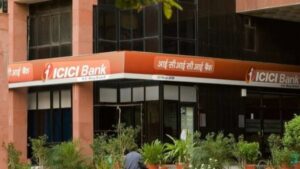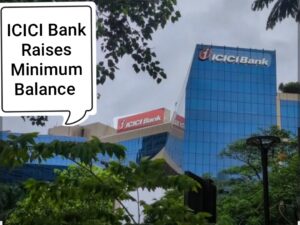ICICI Bank Raises Minimum Balance Limit : What It Means for You and India’s Banking
ICICI Bank Raises Minimum Balance Limit : ICICI Bank recently announced a big increase in the minimum average monthly balance (MAB) needed for new savings accounts.
From August onwards, customers in metro and urban areas must keep at least Rs 50,000 in their accounts, up from Rs 10,000.
This change has caused a lot of worry and anger among customers. Many feel it is unfair and are asking the Reserve Bank of India (RBI) to step in.
What is Minimum Average Monthly Balance (MAB)?
Minimum Average Monthly Balance is the lowest average amount of money a customer needs to keep in their savings account every month. If the balance falls below this amount, the bank charges a penalty fee.
Before this change, ICICI Bank’s minimum balances were:
- Rs 10,000 for metro and urban branches
- Rs 5,000 for semi-urban branches
- Rs 5,000 for rural branches
Now, the bank has increased these to:
- Rs 50,000 for metro and urban branches
- Rs 25,000 for semi-urban branches
- Rs 10,000 for rural branches
If customers don’t maintain the minimum balance, they will be charged a penalty of 6% on the amount they fall short or Rs 500, whichever is less. Earlier, the penalty was Rs 450 or less, depending on the shortfall.

Why Did ICICI Bank Raises Minimum Balance Limit ?
According to ICICI Bank and reports from media outlets like NDTV, the bank wants to attract more premium customers—people with higher savings. They want to build a customer base similar to big foreign banks.
This move will also help the bank manage its costs better, especially as running branches and providing services gets expensive.
Along with this, ICICI Bank has also changed rules about cash deposits:
- Customers can now make only three free cash deposits per month at branches or cash machines.
- After that, each deposit costs Rs 150.
- Free cash deposits have a monthly limit of Rs 1 lakh.
- Above this 1 lakh, the bank charges Rs 3.5 per Rs 1,000 or Rs 150 per transaction, whichever is higher.
- Third-party cash deposits are limited to Rs 25,000 per transaction.
How Are Customers Reacting on ICICI Bank Raises Minimum Balance ?
Many people on social media platforms like Twitter (now called X) and Reddit are unhappy with this decision.
They say:
A. It’s too expensive: Most Indians earn less than Rs 25,000 a month. Asking them to keep Rs 50,000 in the bank at all times is unrealistic and unfair.
B. Excludes many: Students, pensioners, gig economy workers, and low-income earners usually have irregular income and cannot maintain such high balances.
C. Hurts the middle class: Some users say this is a way for the bank to “loot” middle-class money.
D. People want to switch: Many are thinking of closing their ICICI accounts, moving their salary credits to other banks, or switching to zero-balance accounts like salary accounts or Jan Dhan accounts.
One social media user pointed out that the minimum balance now equals nearly two months’ salary for many Indians, which is not practical.
What Does the Government and RBI Say?
The Reserve Bank of India has said it does not fix or regulate the minimum balance banks can set.
Banks are free to decide these rules based on their costs and business needs. RBI expects banks to clearly tell customers about fees and penalties, but it does not control the actual minimum balance amounts.
Still, many people want RBI to check this move carefully because it might hurt financial inclusion—the goal of making banking accessible to everyone in India.

What Should You Do as a Customer of ICICI Bank ?
If you have a savings account in ICICI Bank or any other bank, here are some tips:
A. Check your account details: Different account types and branches have different minimum balance rules. See what applies to you.
B. Know the penalty fees: Understand how much you will be charged if your balance falls below the required minimum.
C. Consider zero-balance accounts: Salary accounts or basic savings accounts (like those under the Jan Dhan scheme) usually don’t require minimum balances.
D. Watch your cash deposits: Avoid extra charges by keeping track of how many cash deposits you make and their amounts.
E. Stay updated on RBI guidelines: The regulator may issue new rules to protect customers or improve transparency.
What Does This ICICI Bank Raises Minimum Balance Mean for India’s Banking Future?
ICICI Bank’s decision shows a larger trend in India’s banking sector. Banks are trying to cut costs and focus on more profitable customers, especially as more people use digital banking. However, India still has many low- and middle-income people who depend on affordable banking services.
If banks set minimum balances too high, millions of people might be pushed out of formal banking or forced to use other costly or unsafe methods to manage their money. This could slow down India’s financial inclusion efforts.
Digital banking and fintech companies may help by offering low-cost services, but not everyone has access to technology, especially in rural areas. So banks need to find a balance between making profits and serving all customers fairly.
Conclusion: Balancing Bank Profits and Customer Needs
The hike in minimum balance by ICICI Bank is a significant change affecting many customers. While the bank aims to attract wealthier clients and manage costs, this policy could exclude many Indians from full banking benefits.
Customers should review their options carefully and consider switching to zero-balance accounts if needed. Meanwhile, RBI and the government must keep a close eye on such changes like this ICICI Bank Raises Minimum Balance Limit , to ensure that banking remains affordable and accessible to all.
